#Argos adonis
Text
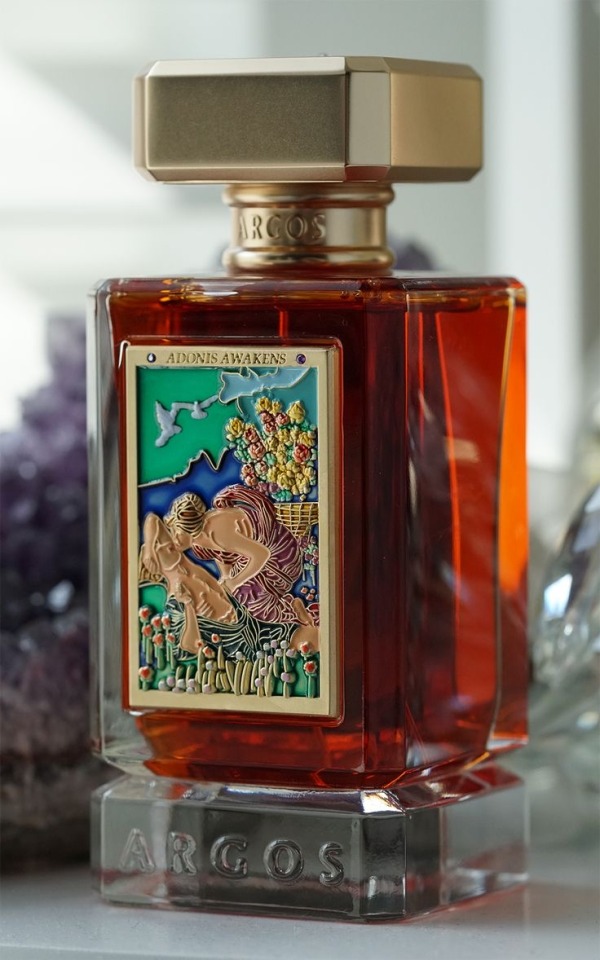
Argos ADONIS AWAKENS Perfume
#Argos ADONIS AWAKENS Perfume#Argos adonis#fashion#luxury#luxury fashion#street fashion#luxury fragrances#authentic fashion statements
58 notes
·
View notes
Text
Mythology Inspired Names: Ancient Greek (masc)
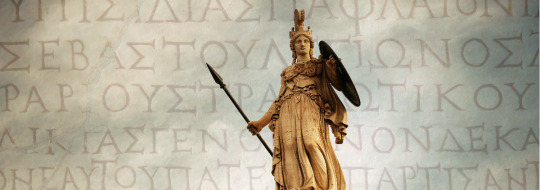
Achilles ~ Greek, meaning "grief," "distress," "he who has people in distress."
One of the most famous of all Greek heroes, Achilles famously gained invulnerability as a baby which aided him as an incredible warrior. Achilles slew Hector in the Trojan War as revenge for killing his lover, Patroclus, but Achilles' rage was so strong the gods intervened, and Achilles was killed by an arrow to his one weak spot, his heel.
pronunciation: ah-kill-eez
Adonis ~ Greek, meaning "lord."
Considered an ideal of male beauty in classical antiquity, Adonis achieved immortality after being killed by a wild boar in a hunting trip. His blood mingled with the tears of Aphrodite, who wept over him, from which a red flower grew. Sometimes an anemone flower, other times a red rose.
pronunciation: ah-don-is
Aion ~ Greek, potentially meaning "path."
In Greek mythology, Aion was a minor deity and the god of cyclical time; the passing of the year, the zodiac, the recurrance of eternal time. He was later associated with mystery religions.
pronunciation: ai-on (I-on)
Apollo ~ Greek, meaning "to destroy," "redemption."
Apollo is one of the twelve Olympians and is the god of archery, the sun, prophecy, music, healing, disease, light, and poetry. Twin to Artemis, Apollo is also well-known for experiencing tragedy in love.
pronunciation: ah-pahl-low
Ares ~ Greek, meaning "bane," "warlike," "ruin."
Another of the twelve Olympian gods, Ares is the god of war and courage. He is the patron of the Amazons, and is known for both incredible violence and savagery as well as valor and honor. His most famous lover is Aphrodite.
pronunciation: air-eez
Argo ~ Greek, meaning "swift."
Argo was the name of a ship from Greek mythology. It was the name of the ship Jason sailed on during his quest to retrive the Golden Fleece.
pronunciation: ar-go
Atlas ~ Greek, meaning "enduring," "to hold."
Atlas is a Titan associated with celestial spheres and the creation of astronomy. After the war between the gods and Titans, Atlas was punished and condemned to hold the weight of the sky for eternity.
pronunciation: at-les, at-lahs
Castor ~ Greek, meaning "beaver."
Castor and his twin, Pollux, are the half-brother children of Leda, a Spartan queen. Castor was born to a mortal father, while Zeus fathered the divine Pollux as a swan. Castor, along with Pollux, was transformed into a constellation named Gemini, meaning "twins."
pronunciation: kas-ter
Damon ~ Greek, meaning "one who tames."
Damon is a mortal man from Greek mythology who, along with Pythias, is shown to be an ideal of friendship. When Pythias is accused of plotting against the tyrannical king, Dionysus I, Pythias asked for the chance to get his affairs in order. Dionysus I agreed, as long as Damon stayed behind as a hostage. If Pythias didn't return, Damon would be killed in his stead. Pythias returned, and Dionysus I released them both, impressed by their bond.
pronunciation: day-men
Eros ~ Greek, meaning "desire," "love."
In some myths, Eros is a primordial god. In others, he is the son of Aphrodite and Ares. In all, he is the god of love, desire, lust, and sex. He is better known by his roman name "Cupid." He is usually depicted with wings and a bow and arrow.
pronunciation: air-ohs, air-os
Hades ~ Greek, meaning "the unseen one."
Never an Olympian, but an incredibly powerful, major god nonetheless, Hades is King of the Underworld and lord of the dead. He is usually depicted with a helm, a two-pronged spear, and his three-headed hound Cerberus.
pronunciation: hey-deez
Hector ~ Greek, meaning "to hold," "holding fast."
Hector was the strongest warrior in Troy and fought in and led armies in the Trojan War. Despite his skill in war, Hector was described as "peace-hearted." He was eventually slain by Achilles.
pronunciation: hek-ter
Helios ~ Greek, meaning "sun," "warming."
In the Ancient Greek faith, Helios is the original god of the sun and brother to Selene, goddess of the moon. He is largely identified with, and later seemingly replaced with Apollo. His Roman counterpart is Sol.
pronunciation: hee-lee-ohs, hee-lee-os
Hermes ~ Greek, meaning "stone heap."
Best known as the herald and messenger of the gods, Hermes is one of the twelve Olympians. He is also the god of travelers, merchants, thieves, messengers, mischief, athletes, and speed.
pronunciation: her-meez
Homer ~ Greek, meaning "security."
The name of the famous Greek poet who credited as the author of both The Iliad and The Odyssey, which tell of the Trojan War and the ten-year journey of Odysseus back to his home in Ithaca after the fall of Troy.
pronunciation: ho-mer
Hyacinthus ~ Greek, meaning "hyacinth."
Hyacinthus was the son of the muse Clio. He was gentle and clever and loved by both Apollo and the god of the west wind, Zephyrus, who accidentally killed Hyacinthus out of jealousy. Apollo wept for him and created a flower to memorialize his lost love.
pronunciation: hi-ah-sin-this, hi-ah-sin-thus
Icarus ~ Greek, meaning "follower."
Icarus is best known for his death. Icarus was the son of Daedalus, a master craftsman and architect of the Labyrinth, in which they both had been trapped by King Minos. To escape, they both strapped wings made from feathers and wax to themselves. They escaped, but Icarus flew too high, and the wax melted in the heat of the sun, resulting in Icarus' fall and death.
pronunciation: ih-cah-ris
Jason ~ Greek, meaning "healer."
Descended from Hermes, Jason was the leader of the Argonauts and a hero famous for finding the Golden Fleece. Originally married to Medea, Jason later left her, losing the favor of the goddess Hera. Jason's successes would eventually lead to the establishment of Rome.
pronunciation: jay-sen
Leander ~ Greek, meaning "lion man."
Leander was a mortal man from Abydos who fell for Hero, a priestess of Aphrodite, from across the strait. Every night, Leander would swim across the strait to be with her, and Hero would illuminate the top of her tower so he knew the one. One winter, a wind blew out the light, and he died. Hero threw herself off the tower to join him.
pronunciation: lee-an-der
Minos ~ Greek, meaning "king."
The King of Crete and a prideful man, Minos was the son of Zeus. After his wife gave birth to a man-bull hybrid, Minos had the Labyrinth built in which he could hide the Minotaur. Every nine years he sent seven boys and seven girls into it to be eaten by the monster. He became a judge of the dead in the Underworld after his death.
pronunciation: mine-ohs
Notus ~ Greek, meaning "south."
Notus is the god of the southern wind. Largely associated with heat, but also the coming of rain and mist, his brothers are Boreas, Zephyrus, and Eurus.
pronunciation: no-tus, no-tos
Orion ~ Greek, "rising in the sky," "dawning."
In Greek mythology, Orion was a great, giant hunter who earned the favor of Artemis. In some myths, he is killed by Artemis as well. In others, he is killed by a giant scorpion. Either way, his story ends in death and he is transformed into a constellation.
pronunciation: oh-rye-en
Orpheus ~ Greek, meaning "orphan," "best voice."
Orpheus was a Greek hero who helped Jason on his quest for the Golden Fleece. Following the quest, Orpheus journeyed to the Underworld to recover his love wife, Eurydice. Orpheus was an amazing musician.
pronunciation: or-phee-us
Perseus ~ Greek, meaning "to destroy"
The Greek hero Perseus is most famous for his defeat of the gorgon Medusa, by decapitating her. Also famous for slaying the sea monster Cetus, Perseus was the son of Zeus and would go on to establish Mycenae.
pronunciation: per-see-us
Pollux ~ Greek, meaning "very sweet."
Pollux was born to the Spartan queen Leda and Zeus disguised as a swan. His half-brother and twin Castor was born mortal, while Pollux was born divine. Pollux asked Zeus to share his immortality with Castor after he was fatally wounded, and the two were transformed into the Gemini constellation.
pronunciation: pah-lux
Prometheus ~ Greek, meaning "forethought."
The myth of Prometheus describes him as the gifter of fire. Despite orders from Zeus, Prometheus gave the gift of fire to humanity and is the father of technology, civilization, and knowledge. Zeus punished him to be bound to a rock, and every day an eagle would peck out and eat his liver.
pronunciation: pro-mee-thee-us
Proteus ~ Greek, meaning "first," "firstborn," "versatile."
Dubbed the "Old Man of the Sea" by the poet Homer, Proteus was an elusive and prophetic sea god. Proteus would only answer the questions of those who managed to capture him.
pronunciation: pro-tee-us
Styx ~ Greek, meaning "shuddering."
Styx is the name of one of the rivers in the Underworld. To cross it is to cross into the Underworld. Styx is also the name upon which the gods swear their most solemn oaths. Styx is gender-neutral.
pronunciation: stix
Theseus ~ Greek, meaning "to set," "institution."
A great hero, Theseus was also a king of Athens. Most well-known for killing the Minotaur, Theseus married the Cretan princess Phaedra after abandoning Ariadne.
pronunciation: thee-see-us
Titan ~ Greek, meaning "defender."
The Titans were a generation of divine beings born to Gaia and Uranus, the primordial deities of earth and sky. Predecessors to the gods, the most famous Titan was the trecherous Kronos, lord of time.
pronunciation: tie-ten
Triton ~ Greek, meaning "sea god."
Triton was the divine son of the Olympian Poseidon and his queen Amphitrite. Largely functioning as his father's messenger, Triton is usually depicted as a merman.
pronunciation: try-ton
Troy ~ Greek, meaning "water," "soldier."
Troy was a great city located in modern-day Turkey and the site of the mythological Trojan War, fought between the Greek forces under Agamemnon of Mycenae and the Trojan forces under Priam of Troy. The Greek gods were also divided during the war.
pronunciation: troi
Typhon ~ Greek, meaning "child of Titans."
One of the most deadly, dangerous monsters in all Greek mythology, Typhon was a giant who attempted to overthrow Zeus and the gods. Many of Greek mythologies monsters were born to him and his wife Echidna.
pronunciation: tie-phon
Zeus ~ Greek, meaning "sky father."
Lord of the skies and king of the gods, Zeus is the chief of the Olympians. His wife is Hera and his brothers are Poseidon and Hades. Zeus is the father of many other Olympians and gods, as well as some of the most famous Greek heroes, including Perseus and Heracles.
pronunciation: zoos
Zephyrus ~ Greek, meaning "westerly wind."
Zephryus is one of the four wind gods and lord of the western wind. Known for being gentle and bringing about the flowers of springtime, Zephyrus fell in love with Hyacinthus and accidentally killed him out of jealousy when Hyacinthus spent more time with Apollo.
pronunciation: zeh-ph-er-us

These name lists are intended to help writers and artists. There is no expectation of credit, and these lists aren't meant to be the end-all be-all lists of possible names. There are millions out there, and this is just for fun!
If you have a suggestion for a name list, or want to see something specific, feel free to submit a request!
And if you see something that is wrong (a pronunciation, a meaning, an origin), again, feel free to let me know!
#writeblr#writing reference#writing resources#writing related#writing research#name list#name ideas#name suggestions#character names#character name list#character name ideas#character name suggestions#male names#male name list#male name ideas#male name suggestions#boy names#boy name ideas#boy name list#boy name suggestions#greek mythology#ancient greek mythology#ancient greece#ancient greek names#ancient greek influence#ancient greek inspired
54 notes
·
View notes
Text
Some names that scratch my brain nicely —
categorized based on vibes tbh + will remain updated!

🌿 Fem:
Claire, Coraline, Caroline, Echo, Edith, Lillian, Marceline, Melody, Lilac, Hilde, Blaire, Lilith, Emma, Cadence, April, Ivy, Iris, Celestia, Jade, Delilah, Gwen,

🍃 Masc:
Trip, Theo, Milo, Miles, Casper, Max, Hunter, Oliver, Blake, Felix, Adonis, Argo, Adrian, Mawce, Marcel, Callahan, Bennett, Cypress,

🌱 Neu:
Cyan, Jasper, Ace, Clove, Bones, Ghost, Calico, Moxxie, Malware, Memento, Jinx, Gray / Grayson, Gloom, Cross, Corvid, Cicada, Caliber,

#names#masc names#fem names#neutral names#masculine names#feminine names#androgeonous names#name suggestions#name ideas#name blog#anti endo#endos dni
118 notes
·
View notes
Text
this is a masterpost of all my homestuck!tboi designs. this wont be a rehash of info from my sketch posts from my main blog theres actual new info i prommy. ill reblog this with new ones when-if i make them ok ?
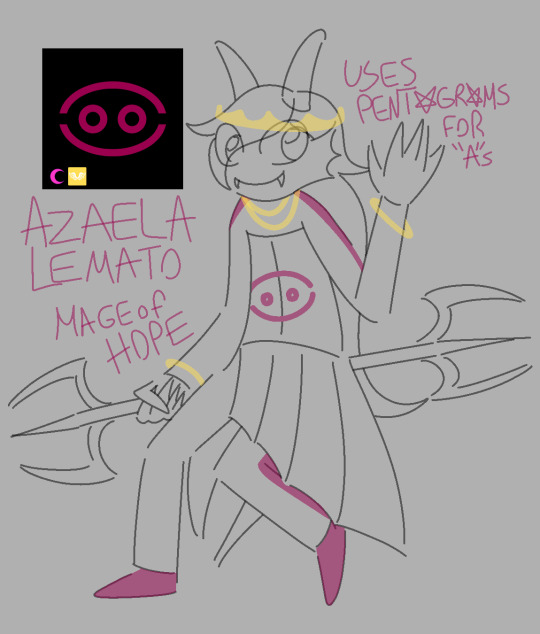
pronouns: any
name explanation: "azaela" is "azazel" with the letters lightly scrambled to homestuck-ify it. "lemato" is from "le mat", the french name of the fool tarot card
sign: pirius, sign of the storyteller
a pangram written in his quirk: ⛧ wiz⛧rds job is to vex chumps quickly in fog!
lusus: gl'bgolyb (<-- fuchsia moment)
trolltag: aspiringGreatness [AG]
strife specibus: 2x3dentkind (<-- fuchsia moment also)
very short classpect explanation: a mage knows their aspect or knows with their aspect. hope represents optimism, belief, truth, etc
shes honestly the tutorial level for the rest of this post
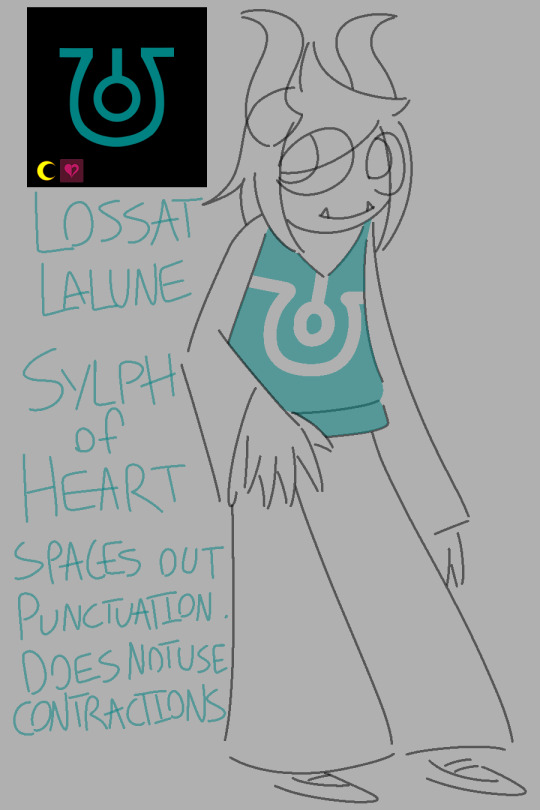
pronouns: they/them
name explanation: "lossat" is a corruption of "lost". "lalune" is from "la lune", "the moon" in french
sign: liblo, sign of the inescapable
pangram: Sphinx of black quartz, judge my vow .
lusus: hawk
trolltag: graciousApotropaic [GA]
strife specibus: polearmkind
classpect explanation: a sylph heals their aspect or heals through their aspect. heart represents feelings, the soul, personality, etc
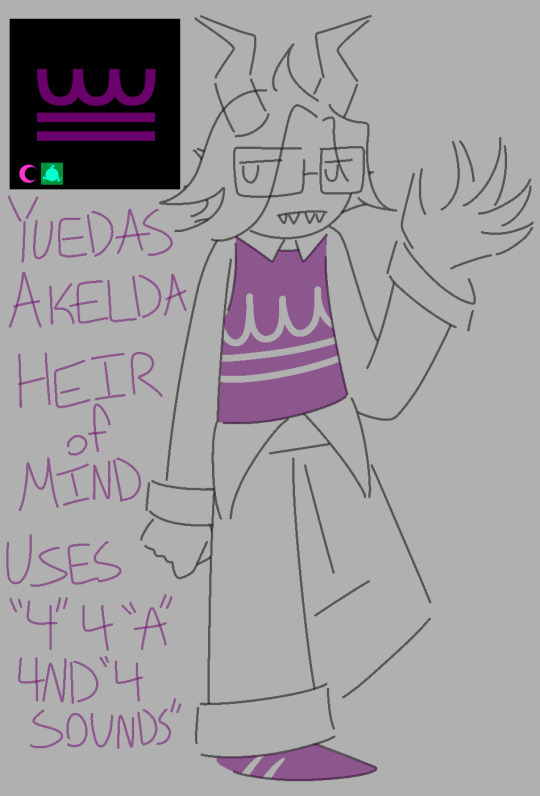
pronouns: he/him
name explanation: the "j" in "judas" was replaced with "y" to make it sound the way most languages pronounce judas' name, which also homestuck-ifies it a bit. i also added an e to make his name 6 letters. "akelda" is from "akeldama" which is where judas from the bible died, also a judas unlock
sign: aquaza, sign of the politic
pangram: W4ltz, b4d nymph, 4 quick jigs vex.
lusus: vampire squid
trolltag: annoyedCombatant [AC]
strife specibus: daggerkind
classpect explanation: an heir changes their aspect or through their aspect. mind represents choices, alternate realities, thought, etc

pronouns: he/him but doesnt actually care
name explanation: "kaenic" comes from "k'aeni", georgian for "cain", and "szeren" comes from "szerencse", hungarian for "luck"
sign: lepia, sign of the synthesizer
pangram: pack my box with five dozen 7iquor jugs
lusus: raccoon
trolltag: convictedAirhead [CA]
strife specibus: 2xknifekind
classpect explanation: a rogue steals their aspect or steals with their aspect, and gives it to others. light represents luck, knowledge, perception, etc

pronouns: he/they
name explanation: "samzun" is just homestuck-ified "samson". "agonis" is from "agonistes", which means "champion" or "combatant", and references samson agonistes. it also sounds like "adonis" which i think is fun
sign: sagicorn, sign of the wild
pangram: Tw⎋ dr↑ven j⎋cks help fax my b↑g qu↑z.
lusus: bear
trolltag: temperamentalGoverner [TG]
strife specibus: fistkind
classpect explanation: a knight exploits their aspect or exploits with their aspect. rage represents chaos, defiance, fear, etc

pronouns: he/him
name explanation: "elazar" is from "el azar", the origin of the name name "lazarus". "fordan" is a corruption of "four days", referencing lazarus' epithet "the four-days dead"
sign: argo, sign of the zenith
pangram: By Jove, my quick ⚕tudy of lexicography won a prize!
lusus: possum
trolltag: gunshyTherapist [GT]
strife specibus: garrotekind
classpect explanation: a page invites exploitation of or invites exploitation through their aspect. space represents creation, manipulation, patience, etc
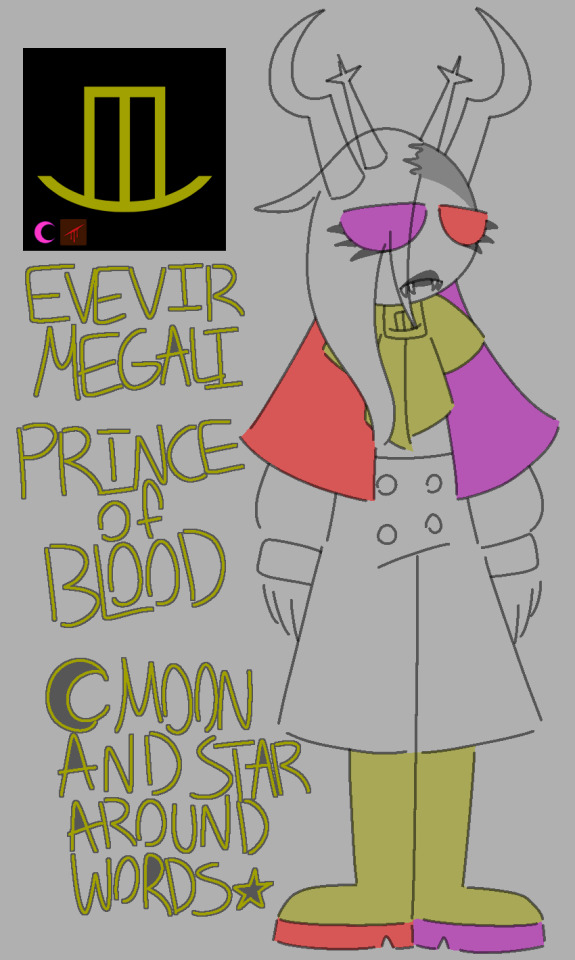
pronouns: she/it
name explanation: "evevir" comes from "vivir", the spanish word for "to live", which hearkens to "hava", the hebrew name of eve, which means "living". "megali" means "great", a reference to babylon the great
sign: gemcen, sign of the entertainer
pangram: ☾ Jackdaws love my big sphinx of quartz ☆
lusus: coyote
trolltag: gothicCacodemon [GC]
strife specibus: clawkind
classpect explanation: a prince destroys their aspect or destroys with their aspect. blood represents relationships, stability, attachment, etc

pronouns: she/her
name explanation: look me in the eye and tell me you dont know where "maggie moriah" comes from.
sign: virsci, sign of the alchemist
pangram: My girl wove six dozen plaid jacke†s before she qui†!
lusus: cow
trolltag: charitableGourmet [CG]
strife specibus: spoonkind
classpect explanation: a witch manipulates their aspect or manipulates through their aspect. life represents healing, positivity, growth, etc


pronouns: he/she/it
name explanation: "bughaw" is from "bugháw", "blue" in tagalog. it also has "bug" in it. "chepri" is one of the transliterations of "khepri", the name of the egyptian scarab-faced god, who can represent rebirth/renewal
sign: scormini, sign of the martyr
alive!pangram: all questixns asked by five watched xperts amaze the judge
dead!pangram: while making deep xcavations we f0und s0me quaint br0nze jewelry
lusus: fly
trolltag: carrionsTransgression [CT]
strife specibus: hatchetkind
classpect explanation: a thief steals their aspect or steals with their aspect. doom represents death, negativity, rules, etc

pronouns: she/they
name explanation: "isscah" is from "iscah", a person mentioned briefly in the bible. okay i chose this name because its a female name starting with "is". "jusawi" means "dice" in korean, and the "sawi" part sounds sort of like "sorry"
sign: taurist, sign of the prosperous
pangram: doi really hvae to do this i m ean i think eevryone knows what crytyping is,
lusus: cat
trolltag: antagonizedTenderfoot [AT]
strife specibus: dicekind
classpect explanation: a seer invites knowledge of their aspect or invites knowledge with their aspect. time represents destruction, artificiality, impulsivity, etc

pronouns: any (with a slight preference for they/them)
name explanation: "edinnu" is the akkadian origin of the word "eden", meaning "plain" (as in a grassland). "bedelo" is from "beddelo", meaning "change"/"vary"/"modify" in somali
sign: capriun, sign of the cartographer
pangram: About sixty codfish eggs wi11 make a quarter pound of very fizzy je11y!
lusus: ferret
trolltag: tempestuousComedian [TC]
strife specibus: jokerkind
classpect explanation: a maid creates their aspect or creates with their aspect. breath represents freedom, independence, apathy, etc
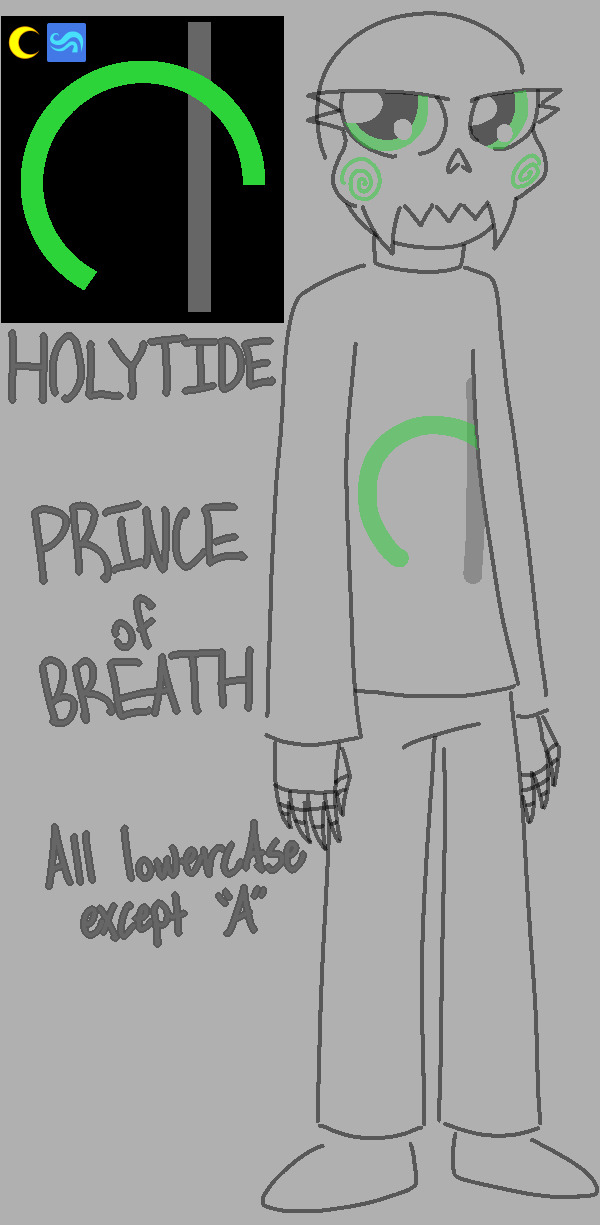
pronouns: he/him
sign: serpens cauda
pangram: A lArge fAwn jumped quickly over white zinc boxes.
screen name: tergiversantArchangel [TA]
strife specibus: pistolkind
classpect explanation: a prince destroys their aspect or destroys with their aspect. breath represents freedom, independence, apathy, etc
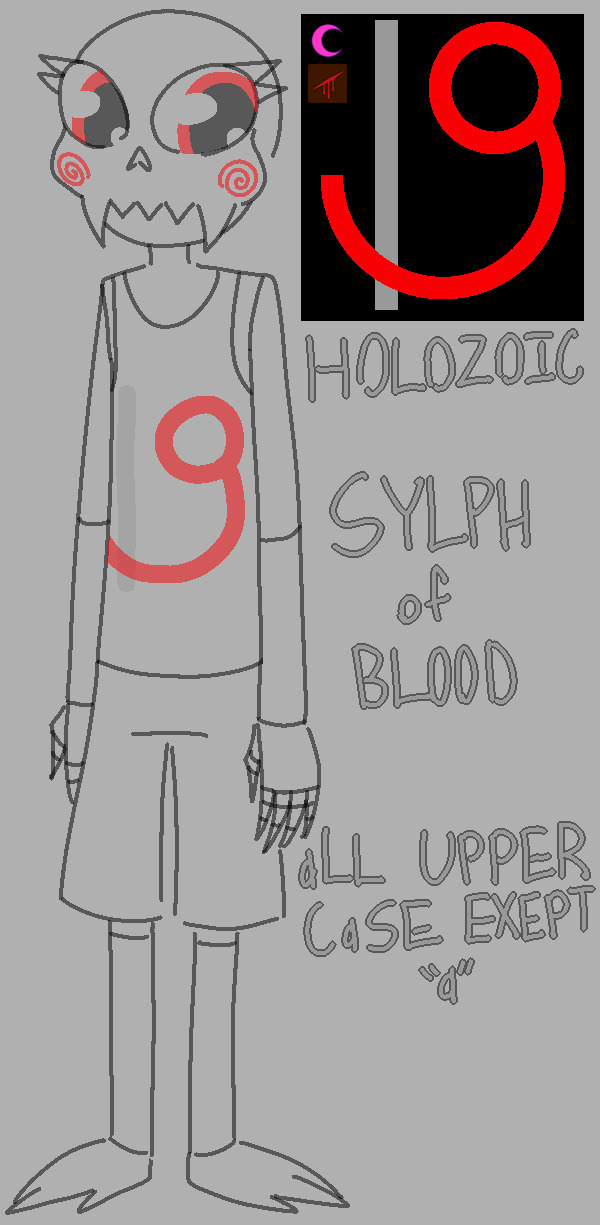
pronouns: she/any
sign: serpens caput
pangram: GRUMPY WIZaRDS MaKE TOXIC BREW FOR THE EVIL QUEEN aND JaCK
screen name: unspokenUltimatum [UU]
strife specibus: chainkind
classpect explanation: a sylph heals their aspect or heals through their aspect. blood represents relationships, stability, attachment, etc
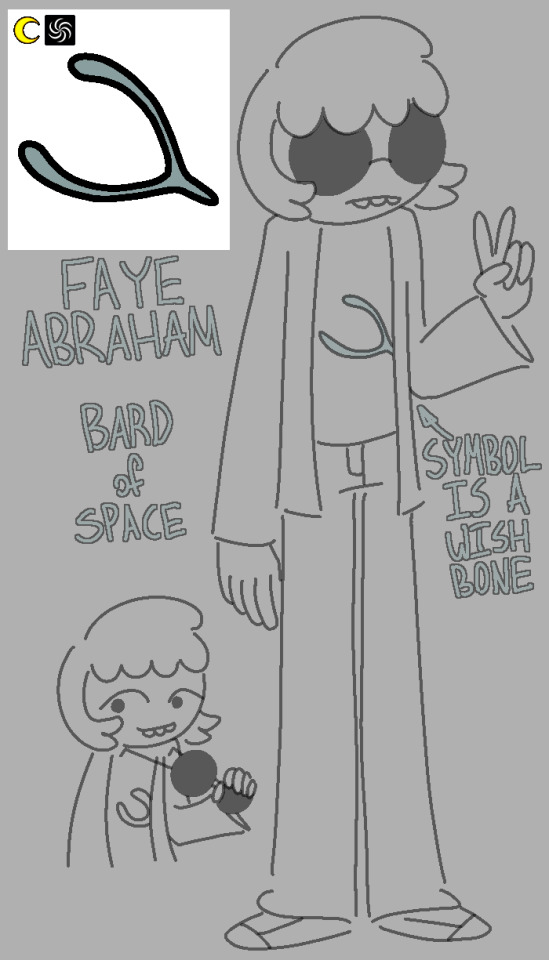
pronouns: she/they
symbol: well it says it right there wish bone
typing style: all lowercase. usually no punctuation except for when there are two sentences in the same line or being particularly blunt
chumhandle: godforsakenGrave [GG]
strife specibus: clubkind
classpect explanation: a bard invites destruction of their aspect or invites destruction with their aspect. space represents creation, manipulation, patience, etc

pronouns: she/they
classpect (if she played): maid of heart (a maid creates their aspect or creates with their aspect. heart represents feelings, the soul, personality, etc)

pronouns: he/they/it
symbol: spider
typing style: HAS A BROKEN CAPS LOCK KEY. SPORADIC PUNCTUATION AND DOESN'T USE COMMAS
chumhandle: cynicalCapitalist [CC]
strife specibus: bombkind
classpect explanation: a rogue steals their aspect or steals with their aspect, and gives it to others. time represents destruction, artificiality, impulsivity, etc

pronouns: he/him, dabbles in others
classpect: sylph of mind (a sylph heals their aspect or heals through their aspect. mind represents choices, alternate realities, thought, etc)

pronouns: she/any
symbol: star
typing style: Proper case and punctuation. Usually uses periods even if it's a question.
chumhandle: thoughtfulThaumaturge [TT]
strife specibus: bookkind
classpect explanation: a mage knows their aspect or knows with their aspect. light represents luck, knowledge, perception, etc

pronouns: he/him
classpect: not this one. the other one is a knight of breath though (a knight exploits their aspect or exploits with their aspect. breath represents freedom, independence, apathy, etc)
this is just some guy like dont even worry about it alright.
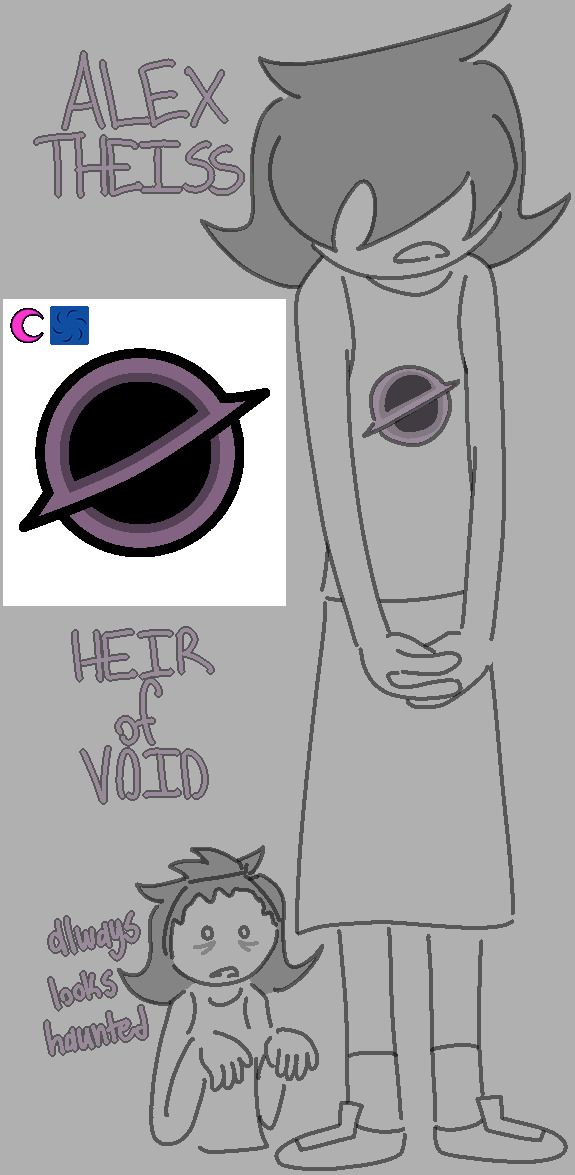
pronouns: they/it
symbol: black hole
typing style: just weird And does whatever. random caps and Punctuation and spacing.. . don't try to pin it down
chumhandle: apparentlyAnnihilative [AA]
strife specibus: scythekind
classpect explanation: an heir changes their aspect or through their aspect. void represents confusion, secrets, infinity, etc
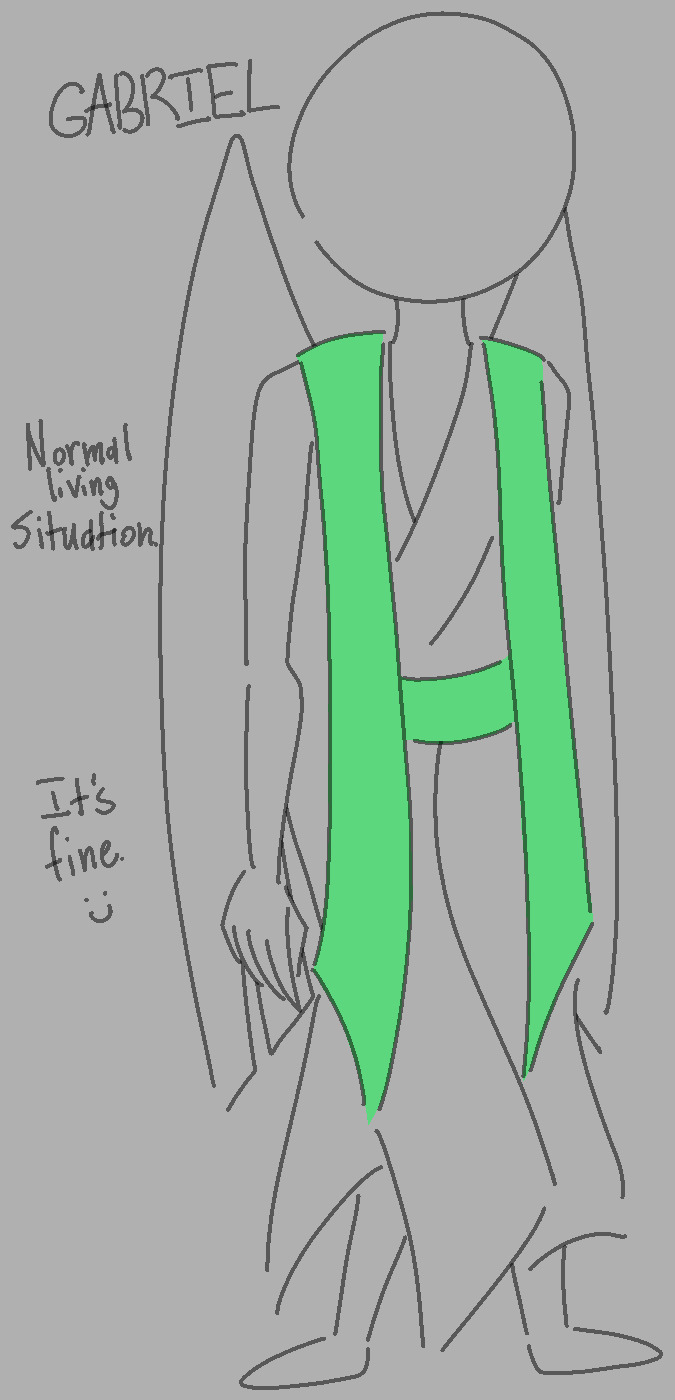
pronouns: "What? I'm going to kill you."
classpect: not this one either. the other one is a witch of rage (a witch manipulates their aspect or manipulates through their aspect. rage represents chaos, defiance, fear, etc)
13 notes
·
View notes
Text
AND,,, here are the big list of names that we have (there's so many so there might be repeating ones but here you go <3):
scooter, brick, casper, jack, crew, casey, arcade, alistair, billiards, landline, elias, silas, adrian, link, valentine, august, beau, marlow, francis, sardonyx, marion, laurence, blip, shutter, pierrot, wake, jamie, angel, piper, harley, paris, caspian, reverend, percival, reagan, nocturn, oracle, augury, helix, gabe, galileo, gale, geo, gyro, gizmo, orion, scorpius, canis, cygnus, corvus, draco, leo, perseus, hydra, betelgeuse, felis, apollyon, puffin, portia, valerian, florian, snapdragon, longhorn, cicada, juliet, toad, cricket, pretzel, chalcedony, carcass, bastion, catacomb, carrion, hunter's moon, ouzel, blackbird, pallid, plenilune, varmint, viol, orchid, mantis, eventide, armory , zealot, lacrimosa, argos, camisado, versailles, alexander, apollo, alcinder, august, elias, julius/jules, knight, valor, leonidas, lionel, pheonix, roman, titus, victor, percival, raegan, carnival, pierrot, dallas, crew, fin, august, val/valentine, jace, orca, gale, sam, squid, leif, sage, caspian, ajax, otto, april, alva, scout, quinn, briar, chalcedony, carcass, otis, bastion, catacomb, carrion, hunter's moon, ouzel, blackbird, pallid, plenilune, varmint, viol, orchid, mantis, eventide, armory, zealot, lacrimosa, argos, camisado, versailles, galileo, gambit, billiards, polybius, arcade, dallas, paris, rome, cable, crew, roo, alois, alastair, caspian, orca, adrian, anchor, dune, crew, erasmus, galiot, heron, landline, twain, gamecube, mechanism, sweepstakes, sundial, archibald, jello, circle, adobe, orwell, pompeii, andromeda, hailey, sirius, stardust, satellite, solar flare, sunspot, waning, titan, keiper, rover, orbit, dipper, ursa, hercules, constellation, belt, rings of fire, red storm, fog, crypt, cloud, frost, hail, daze, dream, drowze, haze, solar, nova, moon, moonwake, floral, rustle, clover, aesthete, splash, poe, bard, stanza, accius, byron, dante, edgar, virgil, wilde, verse, ballad, sonnet, anaphora, lyric, muse, amadeus, tybalt, eldric, alois, beryl, elliot, jasper, sawyer, oslo, raegan, ronan, casper, boris, bruno, chess, arcade, randy, drew, max, landline, browser, mug, cappucino (cino), tulip, mortimer, wilfred, barnaby, sonny, monty, colton, sawyer, cooper, landon, finn, cody, hayden, ashton, miles, arlo, jasper, oscar, ezra, milo, everett, rhys, silas, soren, beckett, river, felix, theo, elliot, william, bowie, baxtor, jax, jay, kaz, magic, alphie, millie, valerie, versailles, paris, jackie, rue, rose, fiore, callie, oliver, francis, charlie, jamie, reese, landline, battery (or battery acid), keyboard, gravel, vault, raegan, nemesis, jasper, sylvester, mars, calamity, valentine, francis , paris, charlie , sticker, pretzel, puffin, junction, chalcedony, dial, cuckoo, alastor, static, livewire, rex, eva, sandie, bouncer, florida, salem, asterisk, lucielle, luminare, cassandra, casanova, alastor, arwen, casimir, dorian, kato, cato, morrigan, basil, anise, cassia, ellis, lennon, xephrys, phineas, theon, castiel, edmond, eldrich, aero, genevieve, gwenivere, aislinn, cordelia, gaia, hera, elsa, ada, ezra, gale, gael, beau, alfred, ackerly, otto, otis, augustine, doris, iris, ida, esther, josephine, alma, beatrix, elsie, effie, alistair, leon, percival, gilbert, atlas, auden, audin, adonis, maynard, hadrian, celia, maude, maudie, rumble, ranger, alistair, aristocracy, delegate, podium, loverboy, cupid’s arrow, lovesick, lovestruck, painted hearts, rose, jaime, reid, rodney, gregg, fang, jock, laurens, pierre, cinn, markus, xander, zane, chartreuse, bumples, RGB, chroma key, the pencil of the earth, palooza, puppet pin, prelude, sizzle, breakfast, clearance, bozo, plasticine, megara, ophelia, delaney, vincent, melinda, seren, cassiopia, darling, griffyn
67 notes
·
View notes
Text
a list of a names!!
andie
Andrea
andreal
Andrew
amasc
ava
avalyn
avalon
avalanche
azure
azula
azuru
azimuth
azuli
azeren
azra
azran
acer
acus
appritor
ansgartion
asterix
alleristic
ademes
adonies
alanew
aiver
ariados
Aurorus
Atticus
alix
aqua
aquetta
Arquette
aquazen
amer
americ
amerilla
archie
alfie
alice
arlo
argo
Aurora
Auroraz
aries
ariesa
ariesen
april
Alison
alliot
Ariel
ariella
andro
Andromeda
Apollo
apolla
alta
altair
altan
altomont
astrophol
astro
astron
astrus
astoceus
astronon
astrol
astrock
Atlas
azu
azi
azimuth
Azim
Antoinette
ash
asher
Ashley
ashlynn
ashey
Aspen
aspeni
alder
acorn
algae
Acadia
AI
android
auto
arcade
Adrian
alchie
aryn
angel
Arian
aro
arrow
aroix
Ander
aspel
Arcane
Ara
arlo
alician
alaric
amary
avaian
aster
althea
atmo
avalon
asustry
angelien
arachnid
arach
axeian
axolt
anomalian
arceus
alleus
ahsoka
akeir
astrea
ayano
Ayesha
ayuna
aloe
Arune
Atheneaus
akai
ache
aroma
aletris
animon
anemone
Auburn
August
Austin
Adam
alew
anise
angoria
avaorice
agya
anora
aninisen
asinine
aprritio
apliline
aristus
averum
altrix
akello
amedeus
aramis
ansel
archer
arui
arruis
auden
Alex
alec
alexander
Anna
anorai
avery
#<3#name ideas#girl names#character names#boy names#baby names#names#aesthetic names#androgynous names#character name#character name inspiration#enby names#genderfluid names#masc names#masculin name#masculine names#name blog#name help#name hoard#name hoarder#name hoarding#name inspiration#name inspo#name list#name recs#name request#name stuff#name suggestions#neutral names#rare names
11 notes
·
View notes
Text
THIS DAY IN GAY HISTORY
based on: The White Crane Institute's 'Gay Wisdom', Gay Birthdays, Gay For Today, Famous GLBT, glbt-Gay Encylopedia, Today in Gay History, Wikipedia, and more …
based on: The White Crane Institute's 'Gay Wisdom', Gay Birthdays, Gay For Today, Famous GLBT, glbt-Gay Encylopedia, Today in Gay History, Wikipedia, and more …


c.2000 B.C. - 1200 B.C. – In Greek mythology, Daphnis was a Sicilian shepherd who was said to be the inventor of pastoral poetry. According to tradition, he was the son of Hermes and a nymph, despite which Daphnis himself was mortal.
Daphnis is also described and portrayed as an eromenos, that is, a boy-lover to older men. His mother was said to have exposed him under a laurel tree, where he was found by shepherds, who raised him, and named after the tree under which he was found. He was also sometimes said to be Hermes' favourite or beloved (eromenos) rather than his son.
Pan also fell in love with him and taught him to play the pan pipes.
A naiad was in love with him and promised to be faithful to him. However, he was seduced, with the aid of wine, by the daughter of a king, and, in revenge, this nymph either blinded him or turned him to stone.

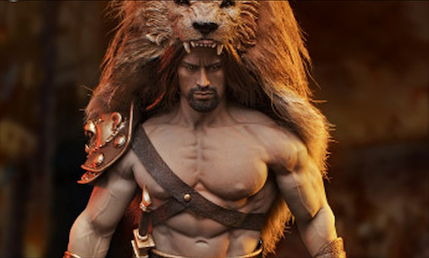
c.1280 B.C. – Hercules (Greek: Herakles) was not only the strongest of the heroes (even as a baby he killed two great serpents with his bare hands) but he was also the craziest (he murdered his first three sons in a fit of madness) and the smartest (what he could not accomplish by brute strength he achieved through guile). What is less well known is that he was as heroic in bed as he was in battle.
One time he was invited by King Thespios to help him rid his land of a huge lion that was terrorizing the countryside. When the king set eyes on Hercules he had a better idea: "Come and stay the night at my palace, and rest yourself before the hunt," said the king to Hercules, "and meet my family." The king's family was made up mostly of his fifty virgin daughters, for whom he had not found fitting husbands until then. That night Hercules made love to forty nine of them (the fiftieth was too shy). The next morning, he and the king went off to hunt the lion, and nine months later all forty-nine daughters gave birth to sons.
But much as he loved women, Hercules loved young men no less. Plutarch said that the number of his lovers was beyond counting. What we know for sure is that he had more than even the god Apollo (who was also a practitioner of male love). Most stories about the beloved boys of Hercules have been lost or destroyed, but among his lovers were said to be the young heroes Admetos, Iphitos, and Euphemos, all of them Argonauts; Elacatas, honored by the yearly Elacatia games in Sparta; and Abderus, an Opian boy and son of Hermes, whose love for Hercules cost him his life, and who was honored with his own festival in the city that bore his name.
Abderus was the young man to whom Hercules entrusted the man-eating mares of King Diomedes. Not strong enough to keep them in check, they tore him to shreds and devoured him. Heartbroken, Hercules built the city of Abdera in his memory.
There was also a myth, now lost, that claimed that Eurystheus, the king for whom Hercules performs his labors, was one of his lovers, and that Hercules undertook the labors in order to please him. If so, then male love becomes the central motive force of the Hercules cycle, just as the love between Achilles and Patroclos is the fire that drives the story of the Iliad.
Also among his lovers, but not so unlucky as Abderus, were Philoctetes who inherited Hercules's bow and arrows, and who was called upon to use them in the Trojan war, and Nestor, the youngest son of King Neleus, whom he grew to love more than any other lad. Nireus, Adonis, Jason, Corythus, Stychius, and Phrynx were reputed to have been amongst his lovers as well.
Of all his boy-man lovers however, the ones he loved the best (besides Nestor) were Iolaos of Thebes, and Hylas of Argos. Iolaos, was also his nephew and, though only sixteen, his helper in many of his labors. It was said that their love was such that Hercules found those labors easier when Iolaos watched him. He was Hercules' charioteer and beloved, just like Patroclos was for Achilles.
As Plutarch tells us: "And as to the [male] loves of Hercules, it is difficult to record them because of their number; but those who think that Iolaos was one of them do to this day worship and honor him, and make their loved ones swear fidelity at his tomb." And also, "It is a tradition likewise that Iolaos, who assisted Hercules in his labors and fought at his side, was beloved of him; and Aristotle observes that even in his time lovers pledged their faith at Iolaos' tomb." The Thebans thought so highly of Iolaos that they worshiped him together with Hercules, named their gymnasium after him, and in his honor held yearly contests, the Iolaeia.
As for the love between Hercules and Hylas, the poet Theocritus had this to say: "We are not the first mortals to see beauty in what is beautiful. No, even Amphitryon's bronze-hearted son, who defeated the savage Nemean lion, loved a boy-charming Hylas, whose hair hung down in curls. And like a father with a dear son he taught him all the things which had made him a mighty man, and famous.
"And they were inseparable, being together both day and night. That way the boy might grow the way he wanted him to, and being by his side attain the true measure of a man. When Jason sailed after the golden fleece, and all the nobles went with him invited from every city, to rich Iolkos he came too, the man of many labors, son of noble Alcmena.
And brave Hylas in the flower of youth went with him aboard the Argo, the strong-thwarted ship, to bear his arrows and to guard his bow."

1994 – UK: A panel of magistrates in London dismissed a paternity suit against singer Boy George for lack of evidence. By George is an English singer, songwriter, DJ, fashion designer and photographer. He is the lead singer of the Grammy and Brit Award-winning pop band Culture Club. At the height of the band's fame, during the 1980s, they recorded global hit songs such as "Do You Really Want to Hurt Me", "Time (Clock of the Heart)" and "Karma Chameleon".
George is known for his soulful voice and androgynous appearance. He was part of the English New Romantic movement which emerged in the late 1970s to the early 1980s. In his autobiography Take It Like a Man, George stated that he had secret relationships with punk rock singer Kirk Brandon and Club drummer Jon Moss. He stated many of the songs he wrote for Culture Club were about his relationship with Moss.


2005 – Off-Broadway musical Naked Boys Singing! re-opens in Milwaukee after being closed by police on obscenity charges two weeks earlier. Naked Boys Singing! is a traditional American vaudeville-style musical revue, with book and direction by Robert Schrock, musical direction by Stephen Bates and choreography by Jeffry Denman, that features eight actors who sing and dance naked.
This campy Off-Broadway musical comedy opened on July 22, 1999 at the Actors' Playhouse in New York City. The show transferred to Theatre Four in March 2004, and again in 2005 to New World Stages Stage Four, until it closed on January 28, 2012. The show has no plot; it contains 15 songs, about various issues, such as gay life, male nudity, coming out, circumcision, and love. The official Off Broadway Revival opened at Theatre Row's Kirk Theatre on April 5, 2012 and is still enjoying a healthy run today

1 note
·
View note
Text
Poorly translated with Google; Κυπρο-Αργολικά
Ἀρταμίτιος was the month in honor of Artemis, common in many calendars, including neighboring Epidaurus (see Samuel 1972:91· Trump (1997: 141)
[…]
The name of the complete martyr so far in any calendar month Ἐριθαιέου is of particular interest. Etymologically it must probably be related to the word ὁ ἔριθος, which means “the worker, the day laborer”. In Homer in particular ἔριθοι are the reapers, while as a female, ἡ ἔριθος, means the weaver, probably from a paretymology that associated the word with ἔρια, hair. To the ancient lexicographers, ellexi generally means the workers of the earth.
[…] the fact remains that the original meaning of the word was “the laborer of the land” and later took on the meaning of “wage laborer” in general. .ριθος however, some cult adjectives Artemis and Apollo must also be associated. So, we have a mess of it from Attica 2 Ου A.D. century (Inscriptiones Graecae II 2, 5005) with the inscription Ἀρτέμιδος | Ἐρείθου
[…]
A third, more interesting testimony comes from Ptolemy Hepheastion, the so-called Hennon, writer from Alexandria, of about 100 AD. According to her, when Adonis died, Aphrodite wandered and looked for him, to finally find him in the city of Argos in Cyprus, in the sanctuary of Apollo Ἐριθίου : « O “(Excerpt 7 of the summary of the book of Ptolemy” Περὶ τῆς εἰς πολυμαθίαν καινῆς ἱστορίας λόγοι ΣΤ΄ “, Rescued by Photios, Library , 153α, 15 [Migne, Patrologia Graeca CIII, column 632]. Cf. Westermann 1843: 198, 11. Cf. also Pauly-Wissowa Realencyclopädie II, 1 (1895), column 52 s.v. Apollon (K. Wernicke) and VI, 1 (1907), p. 468, s.v. Erithaseos (O. Jessen).
It can not be a mere coincidence that a mythical person, symbolizing the annual death and rebirth of nature, is associated with the sanctuary of Apollo Ἐριθίου. Why should we probably attribute to this cult name of Apollo, as in the others mentioned above, the concept of protector of agricultural work and the euphoria of the fruits of the earth. .ριθος ) considers the surname of Apollo Ἐριθάσεος ‘Obscure to all égards’.
We should not be surprised by such a quality of Apollo, which we emphasize is identified mainly with light, divination and music. Myths and myths echo his other earlier qualities, such as that of shepherd (legal) Let us remember the herds of oxen eaten by the brains of fellow student Odysseus, as well as the legend of little Hermes, who exchanged the lyre for his older brother’s herds (Homer, Odyssey , α 8–9· Ὁμηρικός Ὕμνος εἰς Ἑρμῆν , 18. For the same quality of Apollo and the adjective Legal see for example Callimachus, Ὕμνος εἰς Ἀπόλλωνα , 47 · Theocritus, Εἰδύλλια , 25, 21).
But it seems that Apollo was also a god-protector of farmers, a remnant of perhaps an old being as a god of the earth and the products of the plant and animal world. This is presumed by various cult names in many parts of the ancient world, which are characteristic. See mainly Pauly-Wissowa Realencyclopädie II, 1 (1895), s.v. Apollon (K. Wernicke), p. 9 and 51–52.
[…]
Some of these adjectives are associated with specific festivals in honor of Apollo. The most famous were Thargilia And Pianopsia in Attica, which show exactly the relationship between God and agriculture. Thargilia were the beginnings of cereals and πύανα respectively were legumes, especially broad beans. It is also known that the ancient months often took their names from major religious festivals that were celebrated during them. Thus an octopus month Θαργηλιὼν It started around the middle of May, when the alfalfa began to ripen. Respectively o Πυανοψιὼν began after mid-October, after the legume harvest.
[…]
So maybe the month Ἐριθαίεος of Argos to be the month of a so far celebration of their martyrdom * Ἐριθαιέων, in honor of Apollo Ἐριθίου, most likely related to the harvest. It is therefore logical to assume that it was rather a summer month, corresponding to the Attic one Thargilina. In Argos it may have occupied the last place in the year, just before the month Panama.
As far as I know, the location of Argos in Cyprus is not known, for which the only evidence is the one we mentioned above. Of course there were several cities with the name Argos and they are not connected exclusively with Argos in the Peloponnese. But finding the martyr month Ἐριθαιέου in Argos and the cult of Apollo Ἐριθίου in Argos, Cyprus with such a rare name, probably indicate a relationship between the two regions.
Let us not forget the role of the Peloponnese and the neighboring islands in the colonization of Cyprus, where according to Herodotus (5, 113) and Strabo (Geographically, 14, 6, 3) the Argeians had founded Kourion (cf. the expressions in inscriptions from Kourion: Mitford 1971: 195–198, no. 104 (αἷμα τὸ Περσέως) and 165–166, no. 89 (πόλις Περσῆος). the colonization of Kourion and the relevant traditions, see Gjerstad 1944: 110, 113–114). In both the metropolis and the colony, the cult of Apollo was dominant. (Generally for the worship of Apollo in Cyprus, see Glover 1961 and Cayla 2005).
#Apollon#Apollon Erithaeios#epithets#text quote#Erithaeios#Argive#I know this looks like shit I know this reads poorly#it’s the only thing I have to work with 😭
4 notes
·
View notes
Text
GREEK/GERMAN ORIGIN NAMES

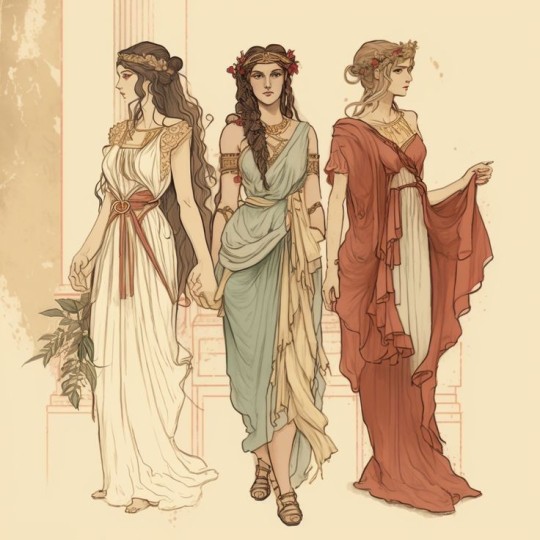

NAMES
Adele
Ella/Ellas
Hanna/Hannah
Hans
Leon
Annika
Johan
Archie
Rainer
Lina/Luna
Zelda
Atticus
Cora
Atlas
Lyra
Tobias
Theo
Thea
Elena
Lydia
Helena
Elias
Calix
Adonis
Angeliki
Aretha
Argus/Argo
Augustin/Augustinos
Calypso
Callie
Callista
Carrisa
Cosmo
Demi
Diantha
Diandra
Despina
Dion
Dione
0 notes
Photo

Sceencaps || King of New York (1990)
GALLERY LINK : [x]
Quality : BluRay screencaptures
Amount : 2297 files
Resolution : 1920x1080px
-Please like/reblog if taking!
-Please credit grande_caps/kissthemgoodbye!
#king of new york#christopher walken#laurence fishburne#david caruso#victor argo#janet julian#wesley snipes#steve buscemi#paul calderon#theresa randle#frank adonis#harold perrineau#capped by randomkiwibirds
12 notes
·
View notes
Video
youtube
True Romance - Tony Scott, 1993
#true romance#the sicilian scene#tony scott#Christopher Walken#dennis hopper#victor argo#paul ben-victor#frank adonis#james gandolfini
6 notes
·
View notes
Text
the horae as attendants
This is the second post in my series about the Horae. You can find the masterpost HERE.
The Horae are the attendants of spring and thus the goddesses most associated with spring. This includes Aphrodite, Persephone and Hera. They are also attendants of Zeus. In addition to this they are called the midwives/nurses of Harmonia and the nurses of Dionysos, Hermes, and Aristaeus.
ZEUS AND HERA
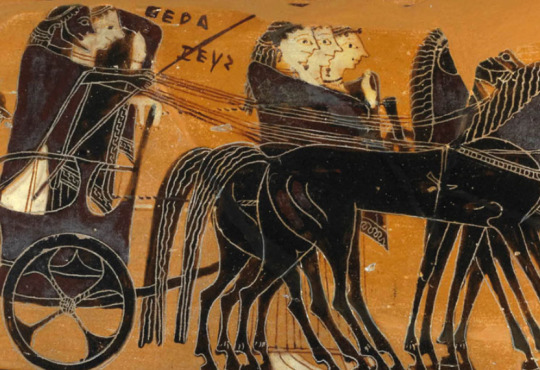
(Zeus, Hera and the Horae)
Zeus and Hera often appear at the same time alongside the Horae, or in similar fashion. The Horae can be found at the back or side of Zeus or Hera (sometimes accompanying the Moirae or the Kharites) or depicted as each on their own throne besides the thrones of Zeus and Hera.
They were seen in the temples of Hera Antheia at Argos and also at Olympia. As goddesses of order they (specifically Eunomia and Eirene) have a connection to marriage and thus Hera. Also, according to Olen in his hymn to Hera, Hera herself was nursed and raised by the Horae - this would have to relate to a different group of Horae though as presumably Dike, Eunomia, and Eirene would have been born after Hera.
Though all of the Horae are said to attend Zeus and he “apportions the seasons as due” (Pausanias, Description of Greece 1. 40. 4), Dike is specifically described as being at his side most often as council to him (presumably taking the place of/alongside her mother Themis) and as sitting by her father and asking him for aid in handing out justice, typically punishments.
“There is virgin Dike, the daughter of Zeus, who is honored and reverenced among the gods who dwell on Olympos, and whenever anyone hurts her with lying slander, she sits beside her father, Zeus the son of Kronos, and tells him of men's wicked heart, until the people pay for the mad folly of their princes who, evilly minded, pervert judgement and give sentence crookedly." - Hesiod, Works and Days 248
APHRODITE
The Horae were present at Aphrodite’s “birth” from the sea. They came to her as she rose from the foam to clothe her, adorn her in jewelry, and bathe her in oils. From there they led her to Olympos, and thus joined her retinue as her handmaidens. This is attested by Homer and a number of other artists, but is often instead said to have been the Kharites, the Erotes, or all three groups of gods who came to her at her birth.
The Horae are thereafter noted to be around Aphrodite constantly, typically with the Kharites, the Erotes, Adonis, Harmonia, Hebe, Peitho, and many other goddesses (usually other personified goddesses in art). They follow her in a constant stream of festivities, always dancing and attending feasts and weddings in her entourage.
Though they are called maiden/virgin goddesses they share many similarities with Aphrodite. They are sometimes called goddesses of beauty and they are responsible for making things like oils, fragrances, and flower wreaths for the goddess. The Horae and Aphrodite are also each associated with flower growth and growth in/protection of the garden.
"She clothed herself with garments which the Kharites and Horai had made for her and dyed in flowers of spring--such flowers as the Horai wear--in crocus and hyacinth and flourishing violet and the rose's lovely bloom, so sweet and delicious, and heavenly buds, the flowers of the narcissus and lily. In such perfumed garments is Aphrodite clothed at all seasons.” - (Stasinus of Cyprus or Hegesias of Aegina, Cypria Fragment 6)
Nonnus calls the Horae the midwives of Aphrodite, saying they aided the goddess when she gave birth to Harmonia.
PERSEPHONE
The Orphic Hymns specifically mention the Horae as attendants of Persephone as well. Outside of the hymns they are connected to Persephone (and by extension Demeter) as being agricultural goddesses and specifically goddesses of spring growth. They are said to have joined and received her when she came back up from the underworld and welcomed spring alongside her.
HERMES AND ARISTAEUS
Philostratus says that the Horae were the nurses of Hermes, and introduced him to concepts like the cow which set him after Apollo’s cows as soon as he could walk. He is also pictured as an adult in art leading the Horae in his company.
Pindar says that when Aristaeus was born Hermes took the child to the Horae to be “gently nursed [upon] their knees.”

(Hermes leads the Horae followed by the spirit of the new year)
DIONYSOS
The Dionysiaca says that the Horae received Dionysos from Zeus at his birth. Presumably with Silenos and other nymphs, the Horae had a hand in raising the god. Also, similar to Hermes, the Horae can be found in the entourage of the adult Dionysos. They were associated as well with feasts, banquets, and other festivities so it is unsurprising that they are pictured in their dance in his presence (also again as agricultural goddesses, specifically fruiting goddesses.)
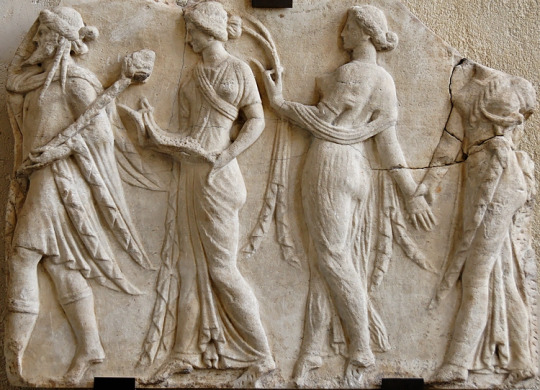
(Dionysos leading the Horae)
#the Horae#the Horai#Horae#Horai#hellenic polytheism#helpol#greek religion#greek pantheon#hellenic paganism#Hera deity#Zeus deity#Aphrodite deity#personal
30 notes
·
View notes
Text
Festivals we know (almost) nothing about
- Part 1
Once in a while, it's good to remember that none of our calendars are complete. This is much more obvious with non-Attic/Athenian calendars, and anyone who decides to jump into attempting to reconstruct the cultic calendar of Delphi, Delos, Sparta, Argos etc. will know exactly what I mean, as they are painfully fragmentary (not to mention the ones that are completely lost).
Because of the contrast between the fairly well-preserved Athenian calendar and the others, we often forget that Athenian calendar we know about is only "well-preserved" but by no means complete.
Back in January, I decided to make an user-friendly calendar and I had to make several choices about how to keep it simple. One of those choices was to get rid of obscure festivals, especially when their date or content is unknown or highly speculative.
The downside of my project is that it further solidifies this illusion of completeness. This is why I'm making this post: here's the list of Athenian festivals we know by name that haven't made it into my calendar for the reasons mentioned above. Emphasis on "know by name", because there's probably a few we completely lost as well. This list likely isn't going to be exhaustive either (took out deme-specific festivals, hero worship, battle commemoration festivals etc. + I probably forgot stuff).
Note 1: This will be cut in parts of 10 festivals because there's really a lot.
Note 2: The aim isn't to tell people to add all of those holy days and festivals to their calendar, that would be way too much for a single person. Rather, this list is meant as inspiration for worshippers, especially those who have relationships with less widely worshipped deities.
The Adonia
Date unknown but probably happened in the summer. We actually have decent information on this one, aside from the date issue. It was primarily a festival for women. A few days before the festival, they would go plant young sprouts of lettuce and other garden plants and cereals on the rooftops. The sprouts, being left out in the sun, would quickly die, which was meant to represent the tragic short-life of Adonis. On the day of the festival, the women would come back on the roof to cry and mourn the death of Adonis.
For a complete study and contextualization of this festival, see "The Athenian Adonia in Context: The Adonis Festival as Cultural Practice" by Laurialan Reitzammer.
The Aiora
A swinging festival of unknown date, though there is debate about it being part of the Anthesteria. The Aiora was probably connected to the death of Erigone.
The Amarysia
Pausanias is our only source of a cult to Artemis Amarysia in Athens (Description of Greece 1. 31. 5):
"Amarynthus is a town in Euboea, the inhabitants of which worship Amarysia, while the festival of Amarysia which the Athenians celebrate is no less splendid than the Euboean. The name of the goddess, I think, came to Athmonia in this fashion and the Colaenis in Myrrhinus is called after Colaenus."
We have no further information for this cult in Athens specifically.
The Anthesphoria
This one is tricky to fit in the list, because we have very little proof this was ever celebrated in Athens, and most of our sources on the festival trace back to Sicily, even though there are indications it was held in other parts of the Greek world. It was a festival of the flowers focusing around Persephone and Demeter. It was probably held in early spring, if we take into consideration the common stem between Anthesphoria and Anthesterion (anthes = flower), the Attic month of February-March, which alludes to the abundance of flowers during this time of the year.
For a more complete post on this festival, see @verdantlyviolet's breakdown. For a study, see "Hera’s Lettuce Women and the Peculiar Uses of Flowers, Fruit and Vegetables in Ancient Greek Festivals for Women" by Lucinda Guzman (Master's thesis)
The Arrhephoria
Festival held in honour of Athena and Pandrosus, date unknown but it seems to have been linked to the Acropolis.
The Asklepieia
Probably a set of two festivals to Asklepios, one occuring in winter (between the Lenaia and the City Dionysia, so roughly between January and March/April) and another roughly six months later, between the Eleusinia and the Thesea. At this point, it is believed that the latter actually is known under the name of Epidauria, which was celebrated on Boedromion 17 or 18 (around September). Whereas the first festival would fit with an observance to Asklepios known to happen on Elaphebolion 8. It was probably at those two festivals that doctors would make their sacrifices to the god.
The Diisoteria
Two dates are known for this festival to Zeus Soter and Athena Soteria, as there are indications this festival has been changed over the centuries. The original date was Skirophorion 30, the last day of this month (somewhere between June and July, most likely - which also happens to be New Year's eve for the Attic calendar). According to R. Parker, the date was moved in the 4th century BC to be earlier in the month, before Skirophorion 11. A decree from the 2nd century BC indicates Asclepius and Hygieia were also added to the list of recipients.
The Elaphebolia
Festival to Artemis, probably in the month of the same name (Elaphebolion - March/April). We can assume it was held on the 6th day, but we have no certainty. The preparation of ‘deer’ cakes (probably in private houses?) attested by Athenaeus is all that we can be sure of.
The Galaxia
Festival in honor of Cybele, the Mother of the Gods. No date known. For the occasion was offered a golden bowl with ‘galaxias’, a mixture of barley flour and milk.
The Genesia
Festival celebrating the dead, most likely dead parents. It was held on Boedromion 5 (late August - early September). Details are blurry, it's possible this was mostly a private, familial celebration. If there was a public rite distinct from private commemorations, we do not know where it was held.
_______________________
Unless stated otherwise, most of the information is taken from Parker R., Polytheism and Society at Athens, 2005
#obscure festivals#hellenic polytheism#hellenic polytheistic#hellenismos#hellenic festival#hellenic revivalism#hellenic reconstructionism#hellenic gods
313 notes
·
View notes
Note
Pie where would one look if they wanted to learn more about Antheia?
There’s not a lot on the Greek goddess by that name: As one of the Kharites, she was a common attendant of Aphrodite in vase paintings. Hera Antheia had a temple at Argos, while Aphrodite Antheia was known at Cnossus. There was a festival called Antheia that was held to honor Demeter. Athena’s name may share an etymological root.
If you’re looking for information on the Antheia I speak of, then you are looking for information on goddess cults in the Near East, Anatolia, Greece, and Italy. My worship is based in comparative mythology, primarily focused on Ancient Greece. As a starting point look into the following:
• Hera’s syncretism with Rhea and Kybele, as well as with foreign goddesses such as Isis, Uni, and Juno
•Demeter and Persephone’s cult at Eleusis, their earlier titles as the Two Queens in Mycenae, and the development of their relationship to Poseidon between Mycenaean Greece and Classical Greece
•Artemis of Ephesus and the connected cults of Hekate and Selene, as well as her association with Apollon and Orion
•Aphrodite’s evolution from the Near Eastern goddesses of Phoenicia, Sumer, Assyria, and Babylon, particularly with respect to Adonis as the shepherd god
Particularly look into shared mythic themes between these goddesses, their epithets and their etymologies, their consorts and offspring, and their general equivalents in other pantheons. If you wish to continue your search, look into the Star Goddess of Feri witchcraft, Marian devotion in Catholic and Orthodox Christianity, Déanism and Filianism, and other Goddess and Earth-centered faiths and philosophies.
Hope this helps.
16 notes
·
View notes
Text
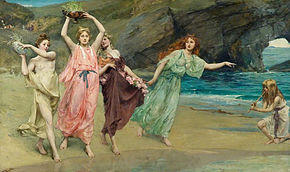
Festival de Adonia
The Gardens of Adonis (1888) by John Reinhard Weguelin depicts the casting of the gardens of Adonis.
O Adonia (grego: Ἀδώνια) era um festival celebrado anualmente por mulheres na Grécia antiga para lamentar a morte de Adônis, o consorte de Afrodite. É melhor atestado na Atenas clássica, embora outras fontes forneçam evidências para o luto ritual de Adônis em outras partes do mundo grego, incluindo a Alexandria helenística e Argos no século II dC.
De acordo com Ronda R. Simms em seu artigo, "Luto e comunidade na Adônia ateniense", a celebração da Adônia foi a única evidência encontrada sobre o culto a Adônis em Atenas, a partir de 1997. Não havia templos, estátuas, ou sacerdotes em adoração a Adônis. [1]
Em Atenas, a Adonia acontecia anualmente, [2] e era organizada e celebrada por mulheres. Era um dos vários festivais atenienses que eram celebrados exclusivamente por mulheres e abordavam temas sexuais ou reprodutivos - outros incluíam Thesmophoria, Haloa e Skira. [3] Ao contrário desses outros festivais, no entanto, o Adonia não era organizado pelo estado, ou parte do calendário oficial do estado de celebração religiosa.
Na verdade, não foi considerado celebrado por nenhum culto oficial, como o culto de Bendis, ou cultos estrangeiros, cujos participantes eram em sua maioria não-nativos, como Ísis.
Prostitutas, mulheres respeitáveis, não cidadãs e cidadãos semelhantes celebraram a Adônia. [6] Também ao contrário da Thesmophoria, a Adonia nunca foi celebrada em uma área designada. [5]
Ao longo do festival, as mulheres atenienses invadiram os telhados de suas casas. Eles dançaram, cantaram e lamentaram ritualmente a morte de Adônis. Eles plantaram "Jardins de Adônis" - sementes de alface e erva-doce, plantadas em cacos de cerâmica - que brotaram antes de murchar e morrer. Após as celebrações no telhado, as mulheres desceram às ruas com estes Jardins de Adonis e pequenas imagens do deus; eles então conduziram uma procissão fúnebre simulada, antes de enterrar ritualmente as imagens e os restos dos jardins no mar ou em nascentes. [7]
Os ritos observados durante o festival não são comparados de outra forma na religião grega antiga; como o próprio Adônis, eles provavelmente se originaram no Oriente Próximo. [8]
A data da Adônia em Atenas é incerta, com fontes antigas se contradizendo. Aristófanes, em sua Lisístrata, faz com que a festa aconteça no início da primavera de 415 aC, quando foi proposta a Expedição Siciliana; Plutarco organiza o festival na véspera da partida da expedição, em pleno verão daquele ano. [2] A Investigação das Plantas de Teofrasto (Περι φυτων պատմ ρια) e o Fedro de Platão são frequentemente considerados evidências de que Adonia foi celebrada no verão. [9] No Egito e na Síria, no período romano, a Adônia coincidiu com o surgimento da estrela Sírio no final de julho. Como a Expedição Siciliana partiu em junho de 415, isso contradiz a datação do Adônia por Aristófanes e Plutarco; a Adônia ateniense deve ter sido celebrada em uma época diferente. [10] Estudiosos modernos discordam sobre qual dessas fontes é a correta. Muitos concordam com Plutarco, e colocam o festival em torno do meio do verão, embora Dillon argumente que a colocação de Aristófanes do festival perto do início da primavera é "sem dúvida" correta. [2] Alguns estudiosos, como James Fredal, sugerem que não havia de fato uma data fixa para a celebração da Adônia. [11]
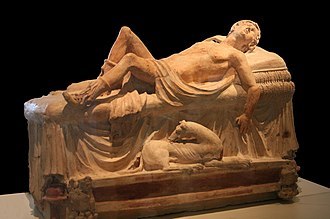
(Morte de Adonis)
Jardim de Adonis
A principal atração do festival em Atenas eram os "Jardins de Adônis", [12] pedaços quebrados de terracota que tinham sementes de alface e erva-doce semeadas neles. [6] Essas sementes germinaram, mas logo murcharam e morreram. [6] Embora a maioria dos estudiosos diga que esses jardins murcharam devido à exposição ao calor do verão, [13] Dillon, que acredita que Adonia era realizada na primavera, diz que as plantas falharam porque não puderam criar raízes no solo raso segurado pelos fragmentos de terracota. [6] Em apoio a isso, ele cita Diógeno, [14] que diz que nos Jardins de Adônis, as mudas "murcham rapidamente porque não criaram raízes". [15] Na Grécia antiga, a frase "Jardins de Adônis" era usada proverbialmente para se referir a algo "trivial e esbanjador". [12] O simbolismo dos Jardins de Adônis também é amplamente debatido: de acordo com James George Frazer, os Jardins de Adônis deveriam ser uma espécie de ritual realizado a fim de promover uma boa colheita, que as colheitas reais deveriam crescer rápido como os pequenos jardins. [16]
Para John Winkler, os jardins pretendiam representar como os homens tinham muito pouco poder quando se tratava de regeneração, nem nas plantas, nem nos humanos. [17] [18] Objetivos dos Jardins Editar Também houve debates sobre o que a mulher fez com os jardins. A maioria presume que eles colocaram os jardins em seus telhados para murchar e morrer, a fim de simbolizar como Adônis "brotou e morreu rapidamente". Simms acredita que os jardins foram feitos para servir de esquife funerário para as pequenas efígies de Adônis. Estas pequenas efígies foram feitas para que as mulheres pudessem ter algo em que focar seu luto, porque todo este festival é suposto lamentar a perda do próprio Adônis.
Fora de Atenas, uma celebração de Adônis é atestada na Alexandria helenística, no 15º Idílio de Teócrito. O Idyll 15 é considerado o mais longo relato sobrevivente da Adonia que temos até agora. [20] O festival descrito por Teócrito, ao contrário do celebrado em Atenas, era um culto com patrocínio do Estado. [21] Incluía uma competição anual entre mulheres cantando canções fúnebres para Adônis. [22] Ritos lamentando a morte de Adônis também são atestados em Argos no segundo século DC: o geógrafo grego Pausanias descreve as mulheres de Argos lamentando a morte de Adônis em um santuário dentro do templo de Zeus Soter. [23] Também no segundo século, On the Syrian Goddess, atribuído a Luciano, descreve uma Adônia celebrada em Biblos. Não há menção aos Jardins de Adônis neste festival, mas a prostituição ritual e os rituais de mistério estão envolvidos nas celebrações. Laurialan Reitzammer argumenta que o festival descrito por Lucian é aquele que foi trazido de volta para a Síria da Grécia, ao invés de ser de origem síria nativa. [24]
Fonte: wikipedia
Conclusões finais
O festival de Adonis representa a mortalidade do sol, é necessário que ele morra todos os anos, para se revigorar e renascer novamente em todo o seu explendpr e auge. Mas ele não é só uma divindade solar, mas sim um jovem pastor ligado a natureza e o ciclo das sementes.
Observações:
Adonis era filho de mirra que teve um caso incestuoso com o seu próprio pai, ela foi transformada em uma árvore pelos deuses ou por Afrodite. Ela era descendente de Pigmalião e da estátua animada por Afrodite segundo o mito.( É costume de muitas divindades antigas serem irmãos &/ou pais de seus consortes). A mirra é árvore resistente de regiões deserticas, erva feminina que representa renovação, cura, morte e vida! "O amor é forte como a morte".
Em março e em setembro é dito por alquimistas que um "pó vermelho" é amado do sol para o planeta. Seria um convite a morte e ressurreição?
A primeira vez que as rosas foram tingidas de vermelho, "Eros".: "A deusa grega Afrodite, do amor e da beleza sensual, apaixonou-se por ele. No entanto, o deus Ares, da guerra, amante de Afrodite, ao saber da traição da deusa, decide atacar Adônis enviando um javali para matá-lo. O animal desferiu um golpe fatal na anca de Adônis, tendo o sangue que jorrou transformado-se numa anêmona. Afrodite, que corria por entre as selvas para socorrer o seu amante, feriu-se e o sangue que lhe escorria das feridas tingiu as rosas brancas de vermelho. Outra versão do mito conta que Afrodite transmutou o sangue do amado numa anêmona."
O mito de Adonis, se esbarra com outra divindade que também passa por transformação: Perséfone. Ambos divindades que representam o ciclo da natureza, respectivamente na versão masculina e feminina.
Adonis não chega a envelhecer, ele morria jovem todos os anos por um javali. Provavelmente a sua "morte" acontecia no período em que o Deus estava na sua fase juvenil, antes de se tornar ancião. (Primavera).
Em algumas versões era dito que Adonis passava metade do ano no submundo e outra metade na superfície. Em outras versões ela passava um terço do ano com Perséfone, um sozinho na superfície e o outro com Afrodite.
Provavelmente o rito que veio do oriente (Adonis) se derivou de algumas mitologias como o de Astarte e Adonis, Ísis e Osíris, Inana e dumuzi. (O rito é citado até mesmo na bíblia).
Na mitologia sumeriana quando Dumuzi vai ao submundo, para ele retornar alguém precisa ficar no seu lugar, uma deusa do vinho chamada Enhestinana.
Minha interpretação:
Afrodite além de deusa do amor, é uma deusa com epítetos funerários, como exemplo "Androphona", a destruidora de homens. Na minha interpretação este epíteto está ligado também ao rito do sexo sagrado, na noite de núpcias, há uma transformação, uma morte. Na bíblia, na passagem do cantinho dos cânticos, que são poesias sobre o sexo sagrado/lua de mel, da yoni da mulher pingava mirra. A mirra simbolicamente representa a morte e nova vida, regeneração. Quando Vênus está como estrela da tarde, ela é a senhora do oeste, o oeste é a direção equivalente ao elemento água e aonde o sol se põe, repousa no colo da deusa, a fim de se renovar. O oeste também é a direção do e onde Afrodite nasce na mitologia, pois é soprada pelo vento primaveril do oeste (Zéfiro). Na minha interpretação a união de Afrodite ao jovem deus, é a união da deusa e do deus perto da primavera, da vida da deusa celeste que faz os campos da terra ficarem verdejantes, a primavera é a estação que representa a ressurreição do deus. Sinto então que o encontro dos amantes, o eterno jovem Adonis se enamora pela Deusa do amor, mas é vítima da cólera de Ares que o mata, levando aos braços de Perséfone. Mas a sua amante Afrodite faz o possível para tê-lo de volta, e é a sua lamentação com a misericórdia de Zeus que ele ressucita.
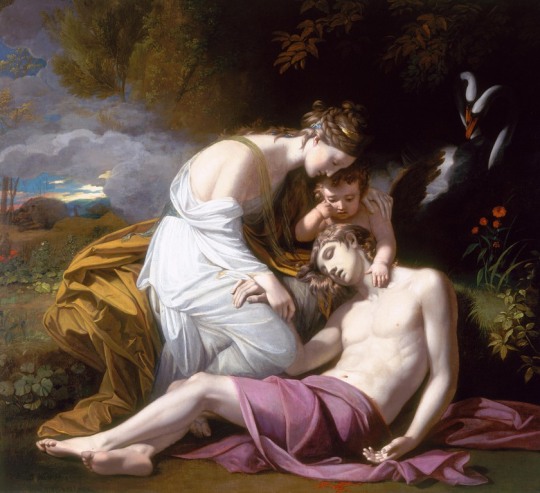
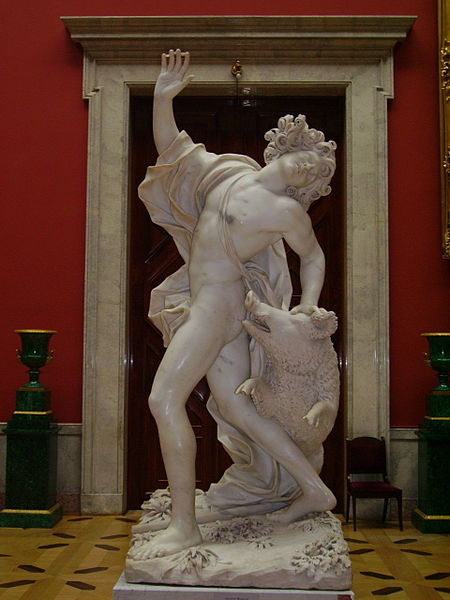
8 notes
·
View notes
Text
im having trouble deciding on what i want to do for Arlos husband, bc like, i already know the shape of their story, (childhood sweat hearts, ooey gooey fluffy sweatness, halmark movies have nothing on them until tragedy hits, and knocks the husband out)
and i know i want the husband to based on some mythological creature/figure because everyone else on the cast is, (Arlo is a unicorn/fey standin, adonis is Galatea, ione is medusa, henry is Pygmalion,)
but the shape of that is so broad that i dont have anything more specific yet.
I know i want him to be big and bearish, bc ive only been drawing twinks recently and i think ive accidentally tricked a fair few people into thinking that i think twinks are sexy bc of how slutty the designs are. and like tldr, twinks pretty, but bears, dilf, muscle bears, and ideally a combination of the above are Where Its At.
Anyways, tangent aside,
ive sorta narrowed it down to these:
1. Minotaur, a big bull man to go with the little horse guy. themes of being trapped and hidden away, which is more Arlo's story than the husbands but big horn bull man sexy.
2. any one of the Many fictional boars that were hunted by various champions. playing up that his demise was directly tied to someone elses victory.
4. furfur, a lying flying deer demon who causes love, creates storms, is a tempest apparently, and is a magic teacher. Again, this one just Fucks.
5. kelpie, water horse who drowns people, cool, excuse to work in water themes and also just the horse x unicorn vibes are nice, a direct comparison of something elegant and beautiful and something more obviously monsterous
7. Argos, the very good dog who waited ten years for his masters return, but when his master arrived he was already very old and weak, the master was unable to greet him because he was in disguise so argos died as his master left him alone. Sad Sad Sad Sad. devoted and loving but ultimately incapable of reaching out to who he loved, (which is the husbands main story.)
8. church grim, a large black dog that watches over and guides and comforts the spirits of the dead within a grave yard, another Very Good Boy. a lawful good counter to Arlos chaotic evil.
12 notes
·
View notes